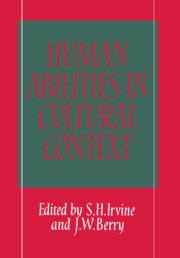Book contents
- Frontmatter
- Contents
- List of contributors
- Preface
- Acknowledgments
- Part I Human abilities in theoretical cultures
- Part II Cultural responses to ability measurement
- 7 The British “cultural influence” on ability testing
- 8 Cultural influences on patterns of abilities in North America
- 9 Human abilities in the Eastern Mediterranean
- 10 The Norwegian experience of test use: A selective review of Norwegian tests and measurements in cultural context
- 11 Human assessment in Australia
- 12 Test performance of blacks in Southern Africa
- 13 Individual differences among the peoples of China
- 14 Japanese abilities and achievements
- Part III Cultural limits upon human assessment
- Author index
- Subject index
13 - Individual differences among the peoples of China
from Part II - Cultural responses to ability measurement
Published online by Cambridge University Press: 13 January 2010
- Frontmatter
- Contents
- List of contributors
- Preface
- Acknowledgments
- Part I Human abilities in theoretical cultures
- Part II Cultural responses to ability measurement
- 7 The British “cultural influence” on ability testing
- 8 Cultural influences on patterns of abilities in North America
- 9 Human abilities in the Eastern Mediterranean
- 10 The Norwegian experience of test use: A selective review of Norwegian tests and measurements in cultural context
- 11 Human assessment in Australia
- 12 Test performance of blacks in Southern Africa
- 13 Individual differences among the peoples of China
- 14 Japanese abilities and achievements
- Part III Cultural limits upon human assessment
- Author index
- Subject index
Summary
Introduction
The term intelligence, as used in the vast majority of psychological publications, obviously refers to the higher mental processes of those reared in the western world (including Western Europe and North America). But the corresponding terms for cognitive abilities in Asian, African, or other less developed countries might very well differ considerably in content, and in the kind of behaviour regarded as “intelligent.” It should be feasible for Chinese or Japanese or Indian psychologists to explore and isolate the major features of intellectual growth in their own peoples, and then devise intelligence tests to sample these features. Such tests might differ considerably from those used in the western world, not only in language and content but also in method of approach. For example, it might be found that multiplechoice items, or time-limited tests, were inappropriate in other cultures, although no attempt has yet been made to discover if this is so. Hence, this chapter will discuss the abilities of Chinese as measured by western-type tests, either of intelligence or other abilities, for example, Thurstone's factors.
One would expect differences in intellectual development between Asians and Caucasians because of their different cultures, child-rearing practices, and educational systems. But in China, additional factors hamper technological and educational progress: for example, the sheer size of the country with its population of 1 billion, four-fifths of whom are classified as rural dwellers. The average standard of living is very low, malnutrition is rife because of dependence on rice as the staple diet; overcrowded conditions of living in the cities are horrendous. Also, the use of a variety of dialects in different parts of the country must hinder communication and education.
- Type
- Chapter
- Information
- Human Abilities in Cultural Context , pp. 340 - 357Publisher: Cambridge University PressPrint publication year: 1988
- 6
- Cited by



